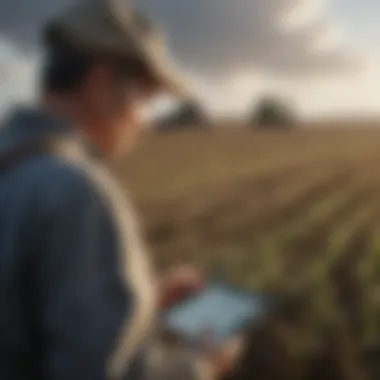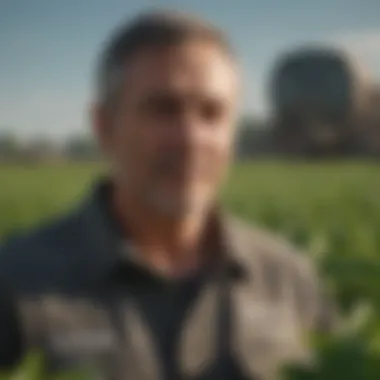The Essential Role of Precision Farming Specialists


Intro
Precision farming specialists play a crucial role in modern agriculture. Their work revolves around the integration of data analytics and advanced technologies to enhance farming practices. As the agricultural sector faces challenges such as climate change, resource scarcity, and shifting consumer demands, these specialists develop innovative solutions to ensure sustainable crop management. In this article, we will explore the contributions of precision farming specialists by examining current trends, essential farming techniques, and the tools and technology that enable increased productivity.
Current Trends in Agriculture and Horticulture
Overview of Recent Innovations
The agricultural landscape is evolving rapidly. Innovations in precision agriculture include the use of drones, remote sensing, and soil sensors. These tools allow farmers to gather real-time data about their fields. Information on soil moisture, nutrient levels, and crop health helps in making informed decisions. The adoption of these technologies demonstrates a move toward data-driven farming.
Another trend is the incorporation of artificial intelligence and machine learning. These technologies analyze large datasets to predict crop outcomes and optimize resource use. Precision farming specialists are vital in implementing these systems on farms, creating a more efficient agricultural model.
Sustainable Practices Gaining Popularity
Sustainability is at the forefront of modern agriculture. More farmers are adopting practices that reduce environmental impact. Techniques such as cover cropping, crop rotation, and integrated pest management are gaining traction. These methods not only help maintain soil health but also enhance biodiversity.
Moreover, precision farming contributes to sustainability by minimizing waste. By applying resources like water and fertilizers precisely where they are needed, farmers reduce excess usage. This practice leads to lower costs and improved yield quality.
Essential Farming Techniques
Soil Health Management
For sustainable production, soil health is paramount. Precision farming specialists emphasize soil testing and amendment to maintain optimal growing conditions. Regularly testing for pH, nutrients, and organic matter allows for tailored fertilization plans.
Additionally, the incorporation of organic matter, through methods such as composting, enhances soil structure. Improved soil health leads to better water retention and support for crop growth.
Pest and Disease Control Strategies
Integrated pest management (IPM) techniques are essential for controlling agricultural pests and diseases. Precision farming specialists assess pest populations through monitoring and modeling techniques. This data-driven approach helps in making timely interventions.
By using biological controls and targeted pesticide applications, farmers minimize chemical use, which is vital for environmental health. Implementing IPM reduces crop losses and leads to more resilient farming systems.
Tools and Technology in Farming
Overview of Advanced Farming Tools
Advanced farming tools are integral to the work of precision farming specialists. Tools such as GPS and GIS technologies help in mapping fields precisely. This mapping enhances planning and optimizing field operations.
Data analytics software has also revolutionized farm management. Programs that analyze yield data, weather patterns, and market conditions assist specialists in strategizing farm operations.
Case Studies on the Use of Technology
Numerous case studies highlight the impact of precision farming technology. For example, a farm in California adopted drone technology to monitor crop health. This practice increased yields by allowing for timely interventions when issues arose.
Similarly, a study in Iowa showcased the benefits of soil sensors. Farmers who utilized these sensors were able to reduce water and fertilizer use significantly, leading to both environmental and economic benefits.
"Precision agriculture is not just about technology; it is about understanding the land and the resources more profoundly."
Through the engagement of precision farming specialists, farmers are navigating the complexities of modern agriculture. Understanding their role in integrating technology and sustainable practices will be crucial as the agricultural sector continues to evolve.
Preface to Precision Farming
The significance of precision farming cannot be overstated in the modern context of agriculture. As the global population continues to grow, farmers face increasing challenges related to efficiency, resource management, and sustainability. Precision farming emerges as both a solution and a necessity. It integrates technology and data to enhance agricultural productivity while minimizing resource wastage and environmental impact.
Precision farming specialists play a central role in this paradigm shift. They enable farmers to adopt innovative practices that yield higher production with fewer inputs. Understanding the principles of precision farming is essential for farmers and enthusiasts aiming to navigate the complexities of current agricultural methods.
Definition and Overview
Precision farming, also known as precision agriculture, refers to the use of advanced technologies to monitor and manage agricultural production processes. The goal is to optimize field-level management with respect to crop farming. It involves a detailed understanding of variations in the field, which can inform practices such as variable rate application of inputs, targeted pest control, and improved irrigation.
Key components of precision farming include:
- GPS technology for mapping fields with high accuracy.
- Remote sensing tools for monitoring crop health and soil conditions.
- Data analytics, which helps in interpreting the data collected to make informed decisions.
This approach not only boosts yields but also promotes sustainability, making it a vital topic within the discourse of modern agriculture.
Historical Context of Precision Farming
The roots of precision farming can be traced back to the mid-20th century when farmers first began using tractors equipped with GPS. However, the real breakthrough occurred with the advent of digital technology in agriculture during the 1990s. The introduction of Geographic Information Systems (GIS) allowed farmers to collect and analyze spatial data on a scale previously unimaginable.


In the early 2000s, remote sensing technology further propelled precision farming into the mainstream. Drones and satellite imagery began to provide real-time insights into crop conditions, enabling timely interventions.
The last two decades have seen an explosion of technological advancements, including machine learning algorithms that predict crop yields and weather patterns. This historical evolution reflects the growing understanding of the need for data-driven decisions in farming. The role of precision farming specialists, hence, has also expanded, evolving into critical positions that bridge the gap between technology and agricultural practice.
Role of Precision Farming Specialists
The role of precision farming specialists is critical in modern agriculture. They utilize advanced tools and techniques to enhance efficiency. Their work helps farmers increase crop yields and manage resources more sustainably. Understanding this role is essential for grasping the larger framework of precision agriculture.
Expectations and Responsibilities
Precision farming specialists are tasked with a variety of responsibilities. They analyze farming data to make informed decisions about planting, irrigation, and harvesting. Their work often involves using software and hardware tools that monitor conditions in fields.
They must also stay updated with the latest trends in technology and farming practices. This keeps farmers informed about best practices and new tools that can improve efficiency. Another important aspect of their role is training farmers and workers in using these technologies.
Skills Required
The effectiveness of precision farming specialists relies on a combination of various skills.
Technical Skills
Technical skills are foundational for anyone in precision farming. These skills include understanding how to operate sophisticated machinery such as GPS systems and drones. This understanding allows specialists to generate accurate data needed for analysis. Moreover, these skills help with troubleshooting when problems arise in the technology being used.
A key characteristic of technical skills is their applicability across various farming methods. Because of this versatility, they are highly beneficial in this field. However, the rapid advancement of technology can make continuous learning a necessity, sometimes presenting challenges for specialists.
Analytical Skills
Analytical skills enable precision farming specialists to interpret complex agricultural data. This involves assessing soil health, crop health, and weather patterns. The key characteristic of analytical skills is the ability to draw actionable insights from raw data. This aspect is vital, as it directly influences farming decisions and practices.
Unique to analytical skills is the requirement to be comfortable with statistical methods and software. This can be a barrier for some but also gives specialists the ability to raise overall farming efficiency. Consequently, these skills play a pivotal role in shaping successful agricultural strategies.
Communication Skills
Communication skills are just as important in this field. They allow specialists to convey complex information to farmers clearly. The key characteristic of strong communication skills is the ability to tailor messages to diverse audiences. This is beneficial in ensuring that all team members understand and implement the strategies developed.
Unique to this skill set is the role it plays in collaboration. Effective communication fosters partnerships between specialists and farmers. This relationship is essential, as it builds trust and encourages the adoption of new technologies or methods. Weak communication, on the other hand, can lead to misunderstandings and reduced effectiveness in implementing precision farming practices.
Precision farming specialists combine technical expertise with analytical and communication skills to support farmers in maximizing productivity and sustainability.
Technology Integrated in Precision Farming
Technology plays a pivotal role in precision farming. It enables farmers to enhance productivity while minimizing waste and ensuring sustainability. As agriculture faces challenges like climate change and population growth, the integration of advanced technology becomes essential. The benefits of employing technology in farming include increasing efficiency, optimizing resource use, and improving crop yield.
GPS and Geospatial Technologies
GPS technology and geospatial data are crucial in precision farming. They provide farmers with accurate information about their fields, enabling them to make informed decisions. Farmers use GPS for mapping fields, which allows for better planning of planting and harvesting.
Moreover, geospatial technologies support variable rate application, where inputs like fertilizers and water are applied only where needed. This reduces excess use, leading to cost savings and lower environmental impact. Understanding and utilizing these technologies also mean keeping up with software updates and training to get the most out of these tools.
Drones and Aerial Imaging
Drones have transformed the way farmers monitor their crops. They provide aerial imagery that reveals the health of plants. This high-resolution data is invaluable for identifying problem areas within large fields. Farmers can quickly address any issues before they escalate.
Drones also facilitate better field mapping and monitoring of crop growth as they can cover large areas efficiently. With this technology, farmers can reduce labor costs and significantly improve the accuracy of field assessments. Integrating drone technology into farming operations can lead to more precise interventions, saving both time and resources.
Soil and Crop Sensors
Soil and crop sensors are vital for collecting real-time data about field conditions. These sensors measure soil moisture, temperature, pH levels, and nutrient content. This information allows farmers to adjust their practices based on the specific needs of their crops at any given time.
For example, moisture sensors can notify farmers when irrigation is necessary, ensuring that water resources are used efficiently. Similarly, nutrient sensors help in determining the right amount of fertilizers needed. By leveraging these data-driven insights, farmers can improve yields while minimizing costs associated with excess inputs.
"Integrating technology into farming practices encourages more sustainable approaches and better resource efficiency."
Data Management in Precision Farming
Data management is a cornerstone of precision farming practices. It encompasses the systematic handling of data collected through various techniques and the subsequent analysis to enhance agricultural outcomes. Utilizing accurate data-driven insights enables farmers to make informed decisions that can lead to increased productivity, efficiency, and sustainability in farming. The integration of technology in data management allows for real-time analysis and retrieval, transforming raw numbers into actionable strategies.
Data Collection Methods
Effective data collection methods are vital for precision farming. They ensure that relevant information about crops, soil, and weather conditions is gathered systematically. Traditional methods include visual assessments and manual recordings; however, modern techniques involve more sophisticated means:


- GPS Technology: This allows for precise mapping of fields and better positioning during planting and application.
- Remote Sensing: Drones and satellite imagery provide aerial perspectives of crop health, enabling farmers to identify issues not visible from the ground.
- Soil Testing: Different soil samples help determine nutrient levels and pH, informing the application of fertilizers and amendments.
Each method contributes to creating a comprehensive data set that can be critical in optimizing farming inputs and practices.
Data Analysis Techniques
Predictive Analytics
Predictive analytics involve using historical data and algorithms to forecast future outcomes. In precision farming, this allows specialists to predict crop yields, pest invasions, or the optimal times for planting and harvesting.
- Key Characteristic: It relies heavily on machine learning, which continuously improves as more data becomes available.
- Benefits: This technique is widely favorable because it helps farmers anticipate challenges before they arise, leading to better preparation and resource allocation.
- Unique Feature: Predictive models can simulate various scenarios, allowing farmers to experiment with different inputs and conditions without any risk.
However, the reliance on past data can sometimes lead to inaccuracies if there are significant changes in environmental conditions.
Spatial Analysis
Spatial analysis focuses on the relationship between different geographical elements within the farming landscape. It uses geospatial tools to analyze patterns and relationships between soil types, crop types, weather, and terrain.
- Key Characteristic: It integrates location-based data, allowing farmers to visualize how different variables affect crop performance.
- Benefits: This technique assists in land management decisions, optimizing crop rotation, and improving irrigation practices.
- Unique Feature: Spatial analysis can leverage data from multiple sources, enhancing its accuracy and reliability.
Nonetheless, complexity in interpreting spatial data can pose challenges for non-experts, requiring additional training or resources to fully utilize its advantages.
"Effective data management within precision farming not only maximizes yield but also contributes significantly to sustainable agricultural practices."
Efficient data management is essential for harnessing the full potential of precision farming techniques. It forms the bridge between technology, agricultural efficiency, and sustainability.
Benefits of Precision Farming
The benefits of precision farming are significant and multi-faceted, impacting the agricultural sector deeply. As farming practices evolve, the contributions of precision farming become increasingly clear. Detailed data collection and analysis enhance decision-making, leading to improved productivity and sustainability across the board.
Increase in Crop Yields
Precision farming directly correlates with an increase in crop yields. By utilizing modern technologies, such as sensors, GPS, and drones, farmers can monitor their fields with high precision. These tools enable them to identify areas that need more attention. Plants in need get tailored care instead of applying the same amount to the whole field.
Key Characteristics of Increased Yields:
- Targeted Analytics: Farmers can analyze crop performance in real-time.
- Resource Allocation: Resources can be allocated more effectively based on precise data.
The use of precise farming techniques provides valuable information that results in healthier plants, which translates to higher yields.
Resource Management and Optimization
Effective resource management is another benefit. Precision farming optimizes inputs, ensuring that farmers use only what is needed to achieve maximum output.
Water Use Efficiency
Water use efficiency is a crucial aspect of crop management. This method allows farmers to apply water only where necessary, which conserves water resources. The ability to assess moisture levels with sensors leads to better understanding of soil needs.
Key Characteristics of Water Use Efficiency:
- Reduction in Waste: Farmers waste less water compared to traditional methods.
- Sustainability: This approach promotes long term sustainability of water resources.
Unique features, such as automated irrigation systems, contribute significantly to effective water management. The advantages of this method are clear: less water is used, resulting in lower costs and better crop health.
Fertilizer Application
Fertilizer application benefits greatly from precision farming as well. Applying fertilizers based on soil nutrient levels ensures that crops receive adequate nutrition. Not all parts of a field may require the same amount of fertilizer, and precise management addresses this need.
Key Characteristics of Fertilizer Application:
- Customized Solutions: Fertilizer is applied based on specific crop needs.
- Cost-Effectiveness: Reduces overall fertilizer costs by preventing overuse.
Automation in this area can adjust application rates in real-time. Its advantages are evident, as it minimizes waste and enhances nutrient uptake by plants. The outcome is healthier crops and increased profitability.
Environmental Impact Reduction
Lastly, precision farming contributes to significant environmental impact reduction. By optimizing resource use, the negative effects on the ecosystem are diminished. Nutrient runoff is minimized, promoting healthier soil and water systems.
In summary, the benefits of precision farming are profound. From enhanced crop yields to effective resource management, precision farming plays a central role in advancing agricultural methods. The integration of advanced technologies fosters a more sustainable approach to farming that meets contemporary demands.


Challenges in Precision Farming
The implementation of precision farming is not without its hurdles. As the agricultural sector continues to evolve, understanding these challenges becomes crucial for both farmers and specialists. These challenges not only affect the immediate operational efficiency of farms but also influence long-term sustainability and productivity. This section highlights the major issues that need attention, including the cost of implementation, skill gaps among farmers, and concerns regarding data privacy and security.
Cost of Implementation
Cost is perhaps the most significant barrier to the widespread adoption of precision farming techniques. The initial investment can be substantial. Farms often require new equipment, such as advanced sensors, drones, and GPS technology. Additionally, software for data analysis and management is another financial consideration.
A thorough cost-benefit analysis is essential for farmers assessing whether to adopt these techniques. While precision farming can lead to increased yields and resource savings in the long run, the upfront costs can deter many. Moreover, financing options are limited, especially for small to medium-sized farms. This can create a divide in who can access the benefits of precision agriculture versus those who cannot.
Skill Gap Among Farmers
Another significant challenge is the skill gap present in the farming community. Many farmers are accustomed to traditional farming methods and may lack the necessary skills to operate modern technology and interpret data effectively.
- Training programs need to be initiated to bridge this gap.
- Extension services can play a crucial role in providing farmers with the knowledge and skills they need.
- Partnerships with agricultural colleges could also be beneficial.
If farmers do not acquire the necessary training, they may struggle to implement precision farming techniques successfully. This could lead to a lack of trust in these new methods and potentially hinder advancements in the agricultural sector.
Data Privacy and Security Issues
As agriculture becomes increasingly reliant on data, issues surrounding data privacy and security escalate. Precision farming involves the collection of large amounts of data from various sources, including soil sensors, GPS data, and weather information. This data is often sensitive and can create vulnerabilities.
Farmers have the right to protect their data. Concerns include:
- The potential for third parties to misuse farm data.
- The risks associated with data breaches or cyberattacks.
- Uncertainties about the ownership of collected data.
Addressing these concerns is paramount. Strong data protection policies must be established, creating trust between farmers and technology providers. As the industry moves forward, ensuring data privacy becomes an essential aspect of sustainable precision farming.
Data transparency and security must be prioritized to ensure that precision farming can thrive in a digital age.
In summary, while precision farming holds great promise for future agriculture, the challenges surrounding its implementation cannot be overlooked. Understanding the financial implications, educational needs, and data security issues will be vital for farmers looking to succeed in this evolving landscape.
Future of Precision Farming Specialists
The field of agriculture is undergoing significant transformation through precision farming specialists. Their role is not just crucial now; it will be even more important as we move forward. Specialists currently help integrate innovative technologies that are changing the landscape of farming. Understanding how their future shapes up helps to grasp the direction of agricultural practices.
Emerging Technologies
AI in Agriculture
AI in agriculture represents a major advance in farming techniques. Its capacity to analyze data quickly allows farmers to make informed decisions. For instance, machine learning models forecast crop yields based on various data inputs. The key characteristic of AI is its ability to process large volumes of data. This makes it a preferred choice in precision farming because it maximizes efficiency.
One unique feature of AI is its predictive analytics capability, which offers real-time insights. The advantages of this include improved yield forecasts and lesser waste of resources. However, implementing AI is not without challenges. Initial setup costs can be high, and there may be a learning curve. Nevertheless, the benefits often outweigh the disadvantages in the long run.
Blockchain in Supply Chain
Blockchain technology offers a new way to manage the supply chain in agriculture. Its capability to provide transparency makes it a vital component of precision farming. The key characteristic of blockchain is decentralization, allowing multiple parties access to the same information. This technology minimizes fraud and increases trust among stakeholders in the agricultural sector.
A unique feature of blockchain is its tamper-proof record keeping. This can benefit farmers by tracking the origin of products. However, the technical complexity of implementing blockchain can be a barrier for some. Despite this, the ability to enhance supply chain efficiency places blockchain as a beneficial choice for the future of agriculture.
Sustainable Farming Practices
The focus on sustainable farming practices is critical for the future of agriculture. Precision farming specialists will emphasize conservation tactics that support ecological balance. Incorporating practices like crop rotation, integrated pest management, and organic farming techniques can minimize environmental impact. This approach focuses on maintaining soil health and resource efficiency.
By adopting sustainable measures, farmers can also enhance productivity. Long-lasting agricultural sustainability depends on specialists continuing to innovate and suggest new methods. It is essential that they balance productivity with environmental responsibilities to ensure that the industry remains viable for future generations.
"Precision farming will define the future of agriculture by emphasizing data-driven decision-making and sustainable practices."
This will require ongoing education and adaptation from farming specialists as new technologies emerge. Therefore, the foresight of precision farming specialists is paramount in shaping both the agricultural economy and our food systems.
Culmination
The conclusion serves a critical function in an article. It wraps up essential ideas and offers reflections on the importance of precision farming specialists. These specialists play a vital role in shaping modern agriculture. They integrate advanced technology, apply data analytics, and contribute significantly to sustainable farming practices. Overall, they help increase productivity and efficiency, which is crucial in a world with growing food demands.
Summary of Key Points
In this article, we have explored several significant components related to precision farming specialists. Here are the main takeaways:
- Role of Specialists: Their job encompasses a wide range of responsibilities, including assessing land, optimizing resources, and implementing technological solutions.
- Skill Set: Key skills include technical proficiency, analytical capabilities, and effective communication. Each skill allows them to address the diverse challenges within the agricultural sector.
- Technological Influence: The use of GPS, drones, soil sensors, and other technologies directly enhances the decision-making process. This means farms can operate more sustainably and productively.
- Data Management: Collecting and analyzing data is fundamental. Different methods, like predictive and spatial analysis, help illuminate trends and inform decisions that affect crop yields and resource use.
- Future Outlook: The persistent evolution of technologies such as artificial intelligence and blockchain further opens new avenues for innovation in agriculture.
Final Thoughts on Precision Farming Specialists
Precision farming specialists are more than mere technicians or data analysts. They act as a bridge between advanced technology and practical agricultural needs. Their insights and expertise can guide farmers towards sustainable practices. As the agriculture sector continues to revolve around technological advancements, the presence of knowledgeable specialists becomes even more critical. Their ability to adapt to new tools and methodologies positions them as key players in ensuring food security and environmental sustainability. By understanding their roles and contributions, we can appreciate the evolving nature of farming today.
"Precision agriculture is not just a trend; it’s the future of farming that ensures we maintain productivity without compromising our planet's health."
This focus on efficiency, productivity, and sustainability makes precision farming specialists invaluable in our modern agricultural landscape.



